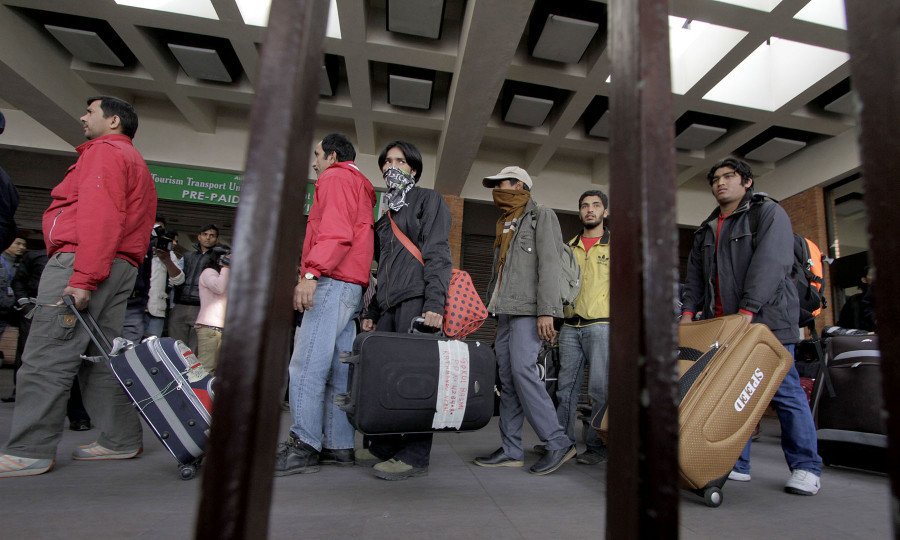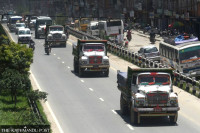National
‘I’ll have to migrate sooner or later.’ Returnee migrant workers are unaware of government job schemes
Several programmes have been rolled out to help migrant workers, but a study finds the government has failed to communicate these programmes to the beneficiary groups.
Chandan Kumar Mandal
After toiling in Saudi Arabia for three years, Ajay returned to Nepal on a job break in February.
The 31-year-old from Mahottari had a job of an assistant mason in the Persian Gulf country. The pay wasn't much but it supported his family back home. Ajay had managed to get an extended period of leave from his job after three years, so his joy was beyond measure. And then the coronavirus pandemic hit.
Within weeks of his homecoming, coronavirus cases started erupting around the world, including in Saudi Arabia. Soon Saudi Arabia and Nepal went under strict lockdowns and suspended international flights to contain the virus. Ajay’s plan to return to his job was indefinitely postponed.
“I contacted my company several times. They told me to wait until the flights resume,” said Ajay, who wanted to be identified only by his first name. “I needed that job desperately.”
Ajay waited for months as the government in Nepal continued to extend the lockdown period. Meanwhile, his hopes of getting back to Saudi Arabia and joining his job were fast fading. What he had dreaded soon came to pass: his visa expired, effectively ending his prospect of returning to his job.
Now Ajay, the father of two, has no idea how he is going to look after his family.
“Nothing is sure now. I don’t know whether my company will call me back,” he told the Post over the phone from his village home in Mahottari Rural Municipality. “I wish I could do something here in my own country. But I don’t know how that will be possible.”
In Kathmandu, some 250km away from Ajay’s village, the federal government has been saying that it would provide income opportunities to unemployed youths and those who lost their jobs due to the Covid-19 pandemic.
A majority of returnee migrant workers like Ajay, however, are unaware that the government has pledged to provide them jobs and other income generating opportunities, according to a latest report.
The report, ‘A rapid assessment of migrant workers during the pandemic’ found out that an overwhelming 70 percent of surveyed workers were completely unaware about these programmes that were prominently featured in this year’s budget.
The survey, which was conducted among 625 migrant workers based in eight primary destination countries— United Arab Emirates, Saudi Arabia, Qatar, Oman, Kuwait, Bahrain, Malaysia and India—found only 2 percent of the survey participants knew how to access the government-announced schemes.
According to Sharu Joshi Shrestha, a gender and migration expert, the targeted groups being unaware about these schemes shows the lack of seriousness on the part of policymakers at the centre.
“If these workers are not aware of these schemes, this is also a violation of their right to information, which is a constitutionally guaranteed right,” Shrestha told the Post. “This should serve as a wake-up call for the government bodies and the development partners who have also invested in these initiatives.”
There are a slew of programmes like Prime Minister Employment Programmes, Prime Minister Agriculture Modernisation Project, Youth and Small Entrepreneur Self Employment Programme, soft loan schemes for returnee migrant workers and various government-supported vocational training, among other schemes to support livelihood and employment generation in the country.
Furthermore, through annual policies and programmes for the fiscal year 2020-21, the government has pledged seed money to innovative youths, entrepreneurs and returnee migrant workers to start new ventures.
The annual budget for this fiscal year also puts a heavy weightage on employment generation, mainly focusing to benefit returnee migrant workers. The government has set an ambitious goal of creating over 700,000 jobs in the country in this fiscal year.
But information about all these programmes have failed to reach the targeted groups.
Experts like Shrestha say the programmes announced by the government are unlikely to succeed when the beneficiary groups are not kept at the centre while preparing such policies and schemes.
“The government bodies come up with such programmes on their own without keeping the targeted groups at the centre or having prior consultation with them,” said Joshi. “There is a risk of migrant workers not taking the ownership and these initiatives not achieving the expected outcomes. These programmes have been rolled out even without considering what experience, skills and interests of the beneficiary groups.”
The report, jointly conducted by Nepal Policy Institute, a Netherlands based global Nepali diaspora think-tank, and Migration Lab, a Kathmandu-based research and advocacy organisation, further found that nearly 80 percent of the survey participants were interested in self-employment, either in agriculture or non-agriculture, once they return to Nepal.
But, 80 percent of workers that responded to the survey reported that lack of finance was their major constraint in engaging in self-employment as much of their earnings abroad were spent to support the monthly needs of their families back home.
“Migrant workers being less informed about these schemes is also because there are no integrated efforts from all the bodies at all levels. At least chairperson, vice-chairperson and spokesperson of the local levels should have an understanding of these schemes,” said Shrestha, the expert on gender and migration. “Just launching the schemes and its coverage by the media is not going to help. If we are targeting the returnee workers, it should begin with Nepal embassies and local levels on the ground.”
Shrestha highlighted that the government has failed to send a welcoming message to workers who want to return home and start something on their own in the country.
A lack of communication regarding the employment schemes has only made life difficult for workers like Ajay, whose job prospects have been affected due to pandemic.
Unable to fly back to his job in Saudi Arabia, Ajay is planning to start his own shop in the village. But he says he does not have enough capital.
“I have no idea where to go to get a loan. I am counting on my friends and relatives to help me,” said Ajay. “If I don’t get a loan, I will have to migrate sooner or later.”




 23.2°C Kathmandu
23.2°C Kathmandu















